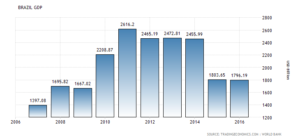A recent investigative report by the New York Times highlighted Brazil’s addiction to junk food and the problem it has created. Companies like Nestlé and Coca-Cola among others have seen decreased profits in wealthy countries have since moved to poorer countries spread out in Latin America, Asia, and Africa. More so, these companies have brought their products directly to consumers by hiring local workers to take and deliver orders by foot. In doing so Brazil is now facing an obesity problem and much larger problems in productivity and job security as a result.
Employees of companies such as Nestlé travel across the country taking and delivering over 800 products. Customers have until the end of the month to pay for their purchase and often find themselves overindulging as a result. While the company does highlight its many healthy products the Times article did note that many end up resorting to foods high in fats and processed ingredients while offering little to no health value despite being advertised otherwise.
The report highlighted the drastic change In the health of the Brazilian people. In 1980, 7% of Brazil was considered obese. That number has since doubled to over 18%. This is directly attributed to the availability of packaged foods. From 2011 to 2016, packaged food sales grew by 25 percent worldwide compared to only 10 in the U.S. Even scarier is the sales of soft drinks which in Latin America have doubled and have since overtaken the North American region in sales.

The problem is much larger than just obesity. Companies such as Nestlé have provided thousands of men and women with jobs that pay very well. What the Brazilian government could not do, Nestlé has. The Times article chronicled a woman who with this job was able to purchase a refrigerator, television, and stove with her earnings and has since elected to save money for a new home.
With so many people becoming obese and being diagnosed with concurrent ailments such as diabetes it doesn’t help that the Brazilian healthcare system is ‘broken.’
In a report by Al Jazeera just before the onset of the Rio Olympics it was reported that federal government experienced a budget shortfall. Hospitals in the area were literally turning people away because they could not service any more patients. Some hospitals lacked basic medical supplies such as saline. Public funds were also misappropriated with $12 million USD going to a social organization contracted to support local hospitals.
Not only are hospitals suffering, but so are farmers. Fields once strewn with vegetables and fruit that comprise a healthy diet have since been replaced by soybeans, corn, and sugar. These ingredients make up the bulk of ingredients that make up processed foods.

The website WITS tracks trade statistics for countries. In 2010, soy beans were the third most exported good by Brazil. Raw cane sugar followed suit in fourth place. Both exports had a U.S. value of $11 and $9 million respectively.
Flash forward to 2015 and soy beans in particular have overtaken the top spot as the most exported product in Brazil. In five years time what was once an $11 million dollar industry has since ballooned to nearly $21 million. Cane sugar stayed in the same spot with a loss of around $3 million.
The country of Brazil is in a very tough spot. While such large corporations have certainly hurt the health of its people as well as the productivity of the country, thousands are benefiting in ways they could not previously. It will be interesting to see where Brazil goes from here.
Sources:
http://wits.worldbank.org/CountryProfile/en/Country/BRA/Year/2010/Summarytext
http://wits.worldbank.org/CountrySnapshot/en/BRA/textview
How Big Business Got Brazil Hooked on Junk Food – The New York …
Leave a Reply
You must be logged in to post a comment.